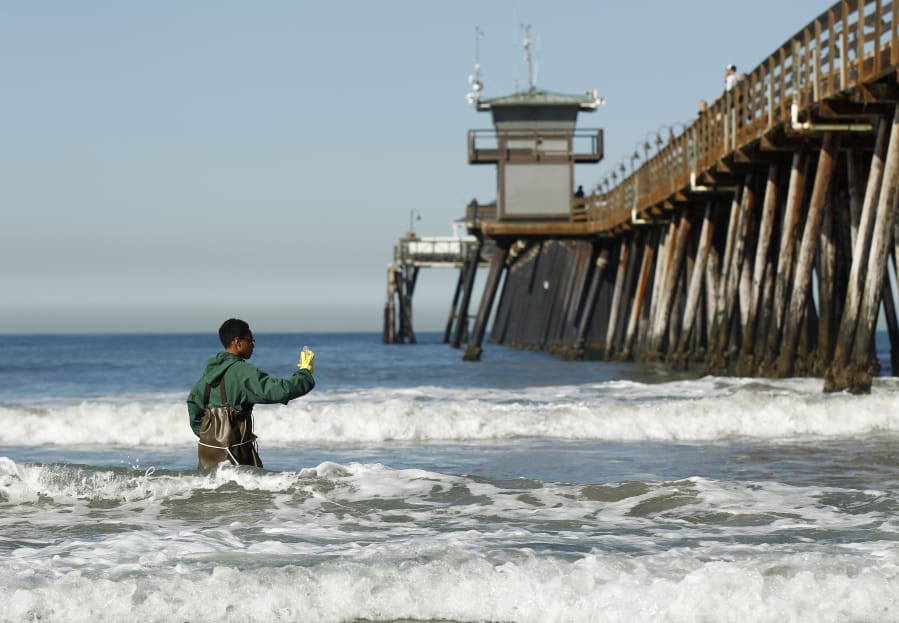IMPERIAL BEACH, Calif. — Josh Hill, a marine biology teacher at Mar Vista High School, lost count of the number of times he’s gotten sick from swimming in the ocean at Imperial Beach.
“It’s just kind of sad that we have this awesome natural resource that we don’t get to use,” he said.
He and a group of students are raising awareness about water pollution by taking weekly water samples of the ocean and publishing their results online.
Every Thursday, Hill and his students collect water from the south end of Seacoast Drive and the Imperial Beach Pier. Volunteers provide samples from the Silver Strand and the beach in front of the Hotel Del Coronado.
Students then take the samples to Mar Vista High School and test them for levels of bacteria. Usually, samples closer to the border have higher levels of bacteria, Hill said.
“Water quality is usually the worst at the (southern) end and it progressively gets better,” he said. “A lot of times you can just see it go from pretty bad, to bad, to sort of bad.”
On Oct. 15, the county closed the Tijuana Slough, Imperial Beach’s southernmost beach, because of sewage from the Tijuana River Valley.
For decades, sewage spills from Tijuana have routinely led to beach closures in Imperial Beach. When the city sued the federal government over alleged Clean Water Act violations earlier this year, cross-border pollution gained more attention on both sides of the border.
Chula Vista and the Port of San Diego joined Imperial Beach’s lawsuit. The Surfrider Foundation also sued over the pollution. Tijuana recently passed a plastic bag ban that is expected to reduce some of the pollution that gets into the Tijuana River Valley.
Hill collects the samples Thursday so they can publish the results on the Surfrider Foundation’s website before the start of the weekend. The nonprofit gave Mar Vista new lab equipment and promotes the results on its Blue Water Task Force web page.
Currently, Mar Vista is the only high school participating in the program. But, the Surfrider Foundation recently got a grant from San Diego Gas & Electric Co. and plans to start a similar partnership with Coronado High School by the end of the year.
Students specifically test for bacteria called enterococcus, which is linked to human feces. According to the EPA, anything between zero and 35 colonies per 10 milliliters is considered “low bacteria.” Anything more than 100 colonies is considered high.
Most of Hill’s students grew up in Imperial Beach. Many have gotten sick from the water or know someone else who has.
“I actually had a neighbor who had to get surgery on his nose from a bone infection he got from surfing,” said senior Cameron Bell, 17.
Bell, who is applying to colleges, wants to pursue a STEM career and appreciates the fact that he can get lab experience.
“Our research really impacts our community because it’s keeping people safe,” he said.
On a recent Thursday morning, sophomore Anthony Gass, 15, collected the samples.
Before he got in the water, his classmates helped him put on waterproof overalls and tied a rope around his waist to protect him from rip currents. The current wasn’t particularly strong and there were surfers already in the water.
Hill said the protection was a bit of overkill but said it’s best to be overly cautious.
“We just want to make sure we protect the students,” he said. “Sometimes, it’s not necessary. But on the off chance that it is, it’s always better to err on the side of caution.”
Gass, who wants to be a scientist when he grows up, said he’s always known the ocean can be a little dirty, but he’s been surprised by the results.
“There’s a lot of bacteria in the water,” he said.



